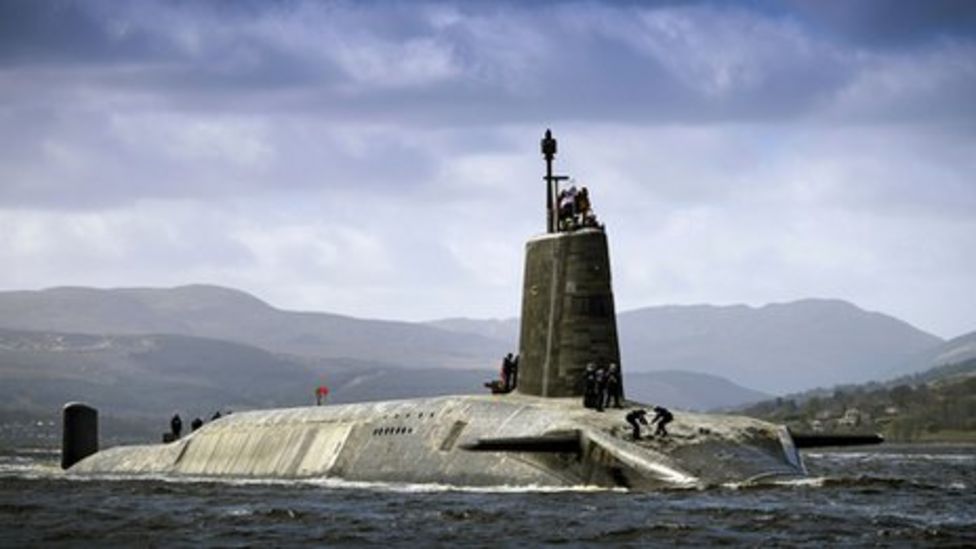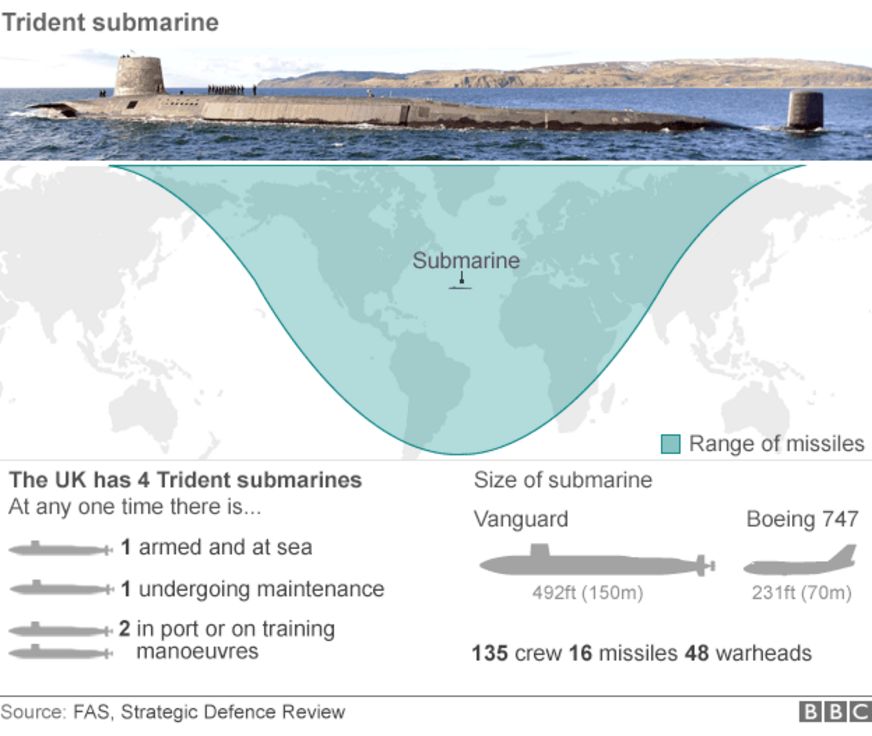
From BBC
10 April 2015
The Conservatives' manifesto will have a commitment to build four new nuclear missile-armed submarines, Defence Secretary Michael Fallon has said.
He accused Labour of using the nuclear deterrent as a "bargaining chip" with the SNP, which would vote to scrap it.10 April 2015
The Conservatives' manifesto will have a commitment to build four new nuclear missile-armed submarines, Defence Secretary Michael Fallon has said.
Ed Miliband said Labour was committed to renewing the Trident system.
SNP leader Nicola Sturgeon said her party would not agree a formal deal with Labour - including "confidence and supply" - unless Trident was dropped.
But she left the option of a vote-by-vote arrangement open.
The Conservatives and Labour are both committed to replacing the UK's ageing fleet of Vanguard class submarines which carry Trident nuclear missiles and maintaining the continuous at sea deterrent - meaning there is always one nuclear-armed vessel on patrol.
Labour has suggested the possibility of reducing the number of submarines from four to three if a continuous deterrent could be maintained, although Mr Miliband said their position at the moment was to stick with four.
The Liberal Democrats favour cutting to three, saying the existing system was designed for the Cold War era.
This election issue includes foreign policy and the role of UK’s defence forces at home and abroad.
The Clyde-based submarines, designed in Barrow in Cumbria, are due to reach the end of their operational lives within the next decade.
A final decision on replacing the system is due in 2016.
The government in 2013 put the bill at between £15bn and £20bn. However, the Green Party said it could run to £100bn.
The Lib Dems have said ordering fewer submarines would save up to £4bn in the long-term, though that claim is disputed.
'Backroom deal'
The SNP has said it would work with Labour in order to keep the Conservatives out of government after the 7 May general election, but it opposes renewing Trident and calls the issue a "red line".Labour has said it will not form a coalition with the SNP, but Tory leader David Cameron has said Labour failed to rule out a post-election "deal".

Fact check: How much would Trident replacement cost?
The Ministry of Defence (MoD) has said it will cost £17.5bn to £23.4bn to procure the replacement system. That is the estimate at 2013-14 prices.Of that, between £12.9bn and £16.4bn would be spent on the submarines themselves.
The Campaign for Nuclear Disarmament (CND) has arrived at the round £100bn figure by two routes. One is to take the MoD's stated intention to spend 5-6% of its defence budget on running its nuclear deterrent.
The different approach is a breakdown of costs.


He also said Ed Miliband was "a man so desperate for power he is ready to barter away our nuclear deterrent in a backroom deal with the SNP".
Ms Sturgeon's "brusque demands should alarm people right across our United Kingdom", Mr Fallon said.
"Our nuclear submarines protect all of Britain including Scotland. This SNP policy is a threat to us all that would dangerously weaken our collective defence," he added.
In a personal attack, Mr Fallon also told Today the Labour leadership election - in which Mr Miliband stood against his brother - showed what he would do to get into power.
Mr Fallon said: "You've seen what he's prepared to do to get into power, the danger now, the risk we face in four weeks time, is that we'll see the same kind of shabby manoeuvre, perhaps with Nicola Sturgeon of the SNP, to get into Downing Street on the back of abandoning our nuclear submarines."
But Mr Miliband said national security was too important to play politics with and accused the Tories of running a campaign based on "deceit and lies".
Speaking at Wednesday night's Scottish political leaders' debate on BBC One Scotland, Ms Sturgeon said: "It is often asked of me: is Trident a red line? Well here's your answer - you'd better believe it's a red line."
Ms Sturgeon later told the BBC she would not agree any formal power-sharing deal with Labour unless Mr Miliband dropped plans to renew Trident.
Ms Sturgeon made clear that would include a confidence and supply agreement, Scottish political correspondent Glenn Campbell said.
She said the SNP could still work with a minority Labour government on an issue-by-issue basis but would not vote for anything that supported Trident renewal.
Asked specifically if this would mean voting down a Queen's Speech, she declined to confirm that it would.
'Worth retaining'
The issue provoked a coalition row in the previous government when the Lib Dems requested a report examining possible alternatives.Sir Nick Harvey, the Lib Dem defence spokesman, told Radio 4's Today programme the nuclear deterrent was "worth retaining".
But he said it did not need to be "patrolling the seas 24/7 when we have no known nuclear adversary".
Maintaining three submarines would allow the UK to maintain "continuous at-sea deterrence", he said. Two submarines would provide a "perfectly meaningful deterrent", but not on a "continuous basis", he added.
Lib Dem leader Nick Clegg said it was "quite extraordinary" the Conservatives think Trident is "the most important thing for which they're in politics".
UKIP leader Nigel Farage tweeted: "Tory Hypocrisy: hitting out at Labour over SNP when they went into coalition with Trident-opposed Lib Dems in 2010 #voteUKIP #defence."
Green Party leader Natalie Bennett said: "The truth is that the Labour leadership has made it clear that they will prioritise spending £100bn on a cold war relic - rather than investing in the schools and hospitals that this country so desperately needs."
All of the parties have faced questions during the election campaign about their plans for defence spending.
Neither Labour nor the Conservatives have committed to matching the Nato target of 2% of GDP beyond 2016. UKIP says it would meet this commitment by cutting foreign aid.



No comments:
Post a Comment